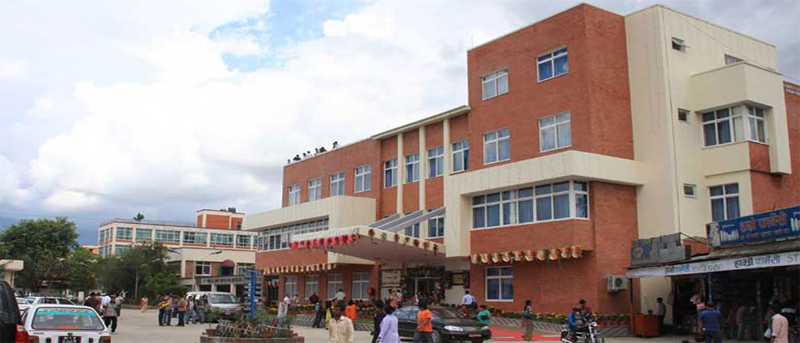
OR
'Barrier' policy for MBBS/BDS students questioned
Published On: October 11, 2018 10:10 AM NPT By: Bishnu Prasad Aryal

Makes govt scholarships a waste of state funds
KATHMANDU, Oct 11: It has been disclosed that a significant number of MBBS and BDS (Bachelor in Dental Surgery) students are disqualified from completing their studies due to repeated failure in exams administered by their respective universities.
The medical students thus disqualified from completing the course include those studying under government scholarships. The existing enrollment criteria is blamed for this barrier phenomenon in medical studies.
"We have specific rules that if a student cannot pass the exams in the given time, he or she will be disqualified," said Prof JP Agrawal, dean of the Institute of Medicine (IOM) under Trivbhuvan University (TU). "We don't discriminate between students under scholarship and those who are self-financing."
Dr Rajendra Koju, dean at Kathmandu University School of Medical Sciences (KUSMS), also said that students are barred from completing their courses if they fail to complete their papers within the set criteria. "Most of the 'barrier' students in our university are foreign students who joined before 2014. The number of such students will decline in future as we have instituted entrance exams for foreign students since 2014," he added.
The two universities have different criteria for disqualifying students.
IOM permits a medical student to sit in the exam for the same paper for up to four times within a period of six years, while KU allows reappearance for six times within 4.5 years. KU also has a special rule under which a student failing in the second year is directly labeled ineligible to pursue the medical course any further.
According to the office of the controller of examinations (OCE) at the two universities, a total of 126 medical students at IOM were stamped ineligible in the last seven years and 65 at KU since 2011.
Officials at both KU and TU admitted that the barrier students included those on government scholarship. Among such students, eight were from the IOM central campus and two from KU's constituent campuses.
However, neither university disclosed the exact number of disqualified students who were under government scholarship. If a student does not complete the course, it is waste of state funding of Rs 4 to 5 million, according to officials at Nepal Medical Council (NMC), the regulatory body for doctors and medical colleges.
Medical colleges funded from within the country provide at least 10 percent of their seats for government scholarships while foreign-invested colleges need to allocate 20 percent of the seats for this purpose.
Besides IOM and KUSMS, two medical colleges—Manipal Medical College, Pokhara and Chitwan Medical College -- also offer medical courses in Nepal. These two colleges are affiliated to foreign universities.
KU and its affiliated colleges have 890 MBBS students at present while IOM is preparing to enroll 661 MBBS and 195 BDS students for the academic session beginning from November 17.
Medical courses are also offered by medical science academies such as National Academy of Medical Sciences, BP Koirala Institute of Health Sciences and Patan Academy of Health Sciences, which are also government- run .
IOM, which was established in 1972, started the barrier system since the early 1990s. KU, which began medical courses in 1994, also adopted a similar policy. However, KU in the past provided grace chances for some barrier students . "It was provided in the past but not any longer as we felt that it produces doctors of inferior quality," Dr Koju added.
Former health minister Gagan Kumar Thapa said that the minimum marks criteria for enrollment in medical colleges should be reviewed to upgrade the quality of medical education. "A candidate should obtain at least 60 percent of marks in the entrance tests," he added. "The existing policy has some faults regarding entrance exams, selection for government scholarships and reservation quotas."
In 2016, the NMC set the standard of at least 50 percent marks in the entrance tests for enrollment in medical studies both within the country and abroad.
Dr Koju conceded that it was necessary to review the entry system. "In the USA, if no student achieves 100 marks in the entrance exams, the highest mark achieved is taken as full marks and used as the basis for the percentile ranking of other students," he said. "Sooner or later, we have to adopt that policy."
NMC officials questioned the policy for scholarship selections and the enrollment of students with low marks by private medical colleges to shore up their bottom line.
You May Like This

Govt hikes MBBS, BDS fees
KATHMANDU, Oct 19: The Medical Education Commission on Thursday increased the fees of medical education. ... Read More...

NUTA seeks recognition of central-level universities to state- owned universities
KATHMANDU, June 20: A delegation from the Nepal University Teachers' Association (NUTA) today called on Prime Minister Sher Bahadur Deuba... Read More...

NMC allocates MBBS, BDS seats to medical colleges
KATHMANDU, Nov 5: The Nepal Medical Council (NMC) on Saturday directed those medical colleges which have been allocated seats for... Read More...





Just In
- MoHP cautions docs working in govt hospitals not to work in private ones
- Over 400,000 tourists visited Mustang by road last year
- 19 hydropower projects to be showcased at investment summit
- Global oil and gold prices surge as Israel retaliates against Iran
- Sajha Yatayat cancels CEO appointment process for lack of candidates
- Govt padlocks Nepal Scouts’ property illegally occupied by NC lawmaker Deepak Khadka
- FWEAN meets with President Paudel to solicit support for women entrepreneurship
- Koshi provincial assembly passes resolution motion calling for special session by majority votes






_20220508065243.jpg)






Leave A Comment